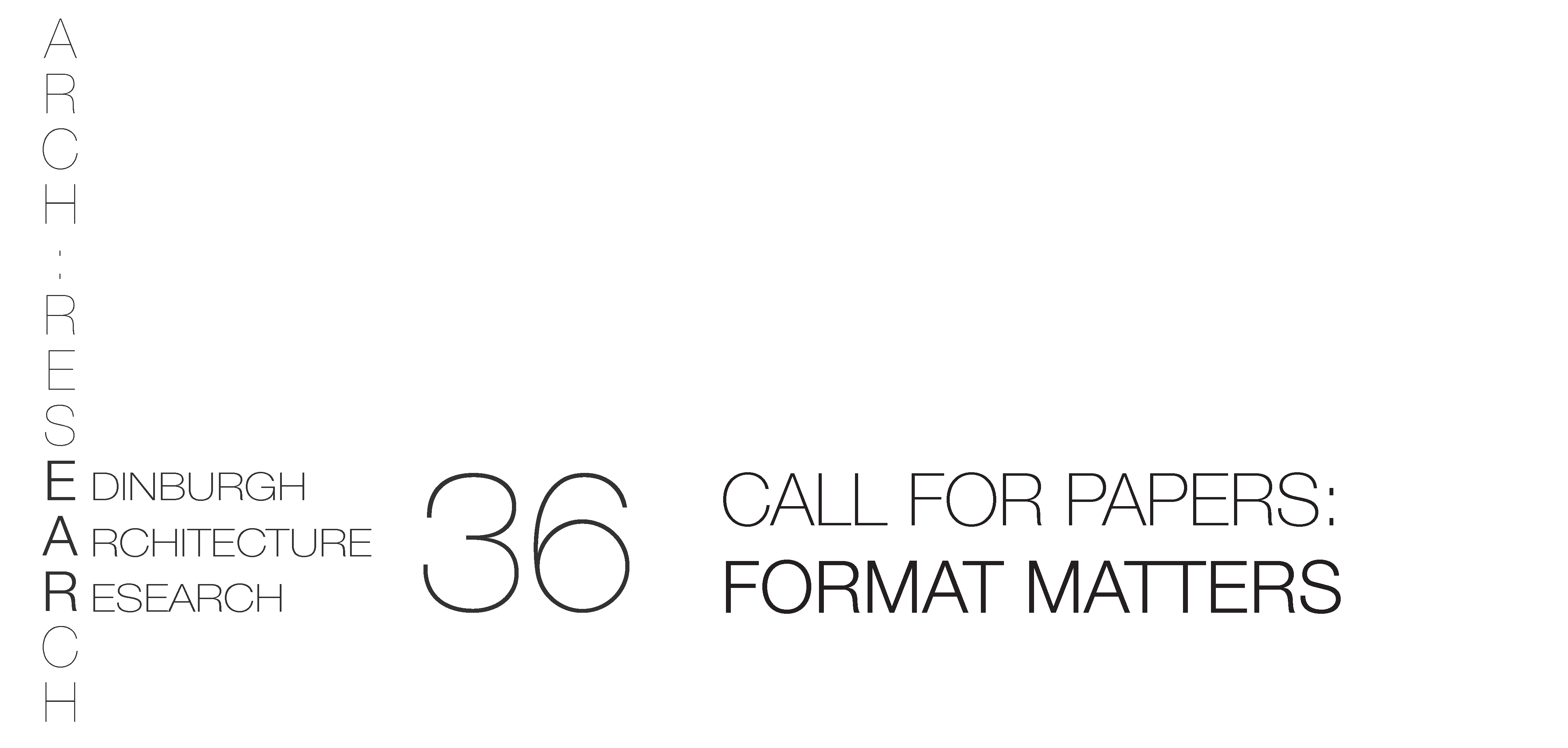Edinburgh Archi:Research Journal
— FORMAT MATTERS —
School of Architecture and Landscape Architecture
University of Edinburgh
- About Archi:Research
The Edinburgh Archi:Research Journal is a non-profit, peer-reviewed, academic journal, published annually by the research students of the Department of Architecture and Landscape Architecture, at the University of Edinburgh since 1978. The journal is undergoing a complete re-brand from print to online, form closed to open issues, from only publishing traditionally formatted papers to incorporating more discursive modes of enquiry and presentation. With this in mind, we are inviting authors to submit abstracts along the theme of Format Matters for articles of 4-5000 words. We are also hoping to make use of the online format and will be accepting abstracts in alternative forms– film, audio, photo essays etc.
2.Theme: Format Matters
Dictionary definition of format:
1: the shape, size, and general makeup (as of something printed)
2: general plan of organisation, arrangement, or choice of material (as for a television show)
3: a method of organising data (as for storage)
We are interested in papers that investigate situations in which a particular format played a crucial rule e.g. the appropriation of books in protest movements or the specific significance of photographs for the reputation of a building. We are also especially interested in papers which explore the effects of reformatting, how and when the change of the format might open up new roads of engagement, inquiry and research and the implications that emerge. How does the choice of format determine the outcome of a project and where is it merely a secondary consideration? When is one particular format no longer regarded as appropriate and how does it affect architectural processes as well as on modes of thinking? As a discipline which transcends many fields of study and which navigates many interested parties, format is fundamental as a tool of communication. What impact has the rise in digital representation had on the communication and creative processes of architecture? Where has inter- trans- a-disciplinarity had an impact on the format and thus transmission of architectural ideas and concepts?
3. List of potential topics
[NB: This list is by no means exhaustive, but intends to offer some possible areas of interest]
- Situations or projects that evolved based on the characteristics of a particular format e.g. maps.
- Works by artists and architects whose work draws heavily on a particular format, e.g. Thomas Demand’s photographs of architectural models.
- Particular instances of where format has impeded the success of a design or concept.
- The role of a particular format on discourse; sketching, modelling, etc.
- Investigations on how the value and specific characteristics of different formats might be used in order to harness their full potential.
- How a prescribed format can stifle progress in practice, thought, or teaching.
- How architecture has crossed disciplines in order to make use of a different format for communication e.g. the growing trend for designers to use film and animation. How different formats instigate an alternative interpretation or effect how a concept is communicated.
- How technological or theoretical developments have reflected or incorporated particular formats, and how this has impacted the discipline.
4. Format of Papers
All papers should be 4-5000 words in length. All papers should be referenced using the Chicago Manual of Style (footnote version). We encourage the use of images but would request a limit of six. Please note that authors are responsible for obtaining copyright for the use of images. Authors will also be required, upon acceptance, to sign a copyright agreement acknowledging the statement above, whilst retaining all copyright to the article itself.
5. Proposed guest reviewers
Abstracts will be reviewed by the editorial team.
Full papers will be double-blind peer-reviewed by members of staff from within the Edinburgh School of Architecture and Landscape Architecture with the College of Art at Edinburgh University.
6. Editorial Team
Sarah Borree (PhD Cultural Studies, University of Edinburgh)
Laura Bowie (PhD Cultural Studies, University of Edinburgh)
Nikolia Kartalou (PhD Architecture, University of Edinburgh)
Download the call as a pdf
